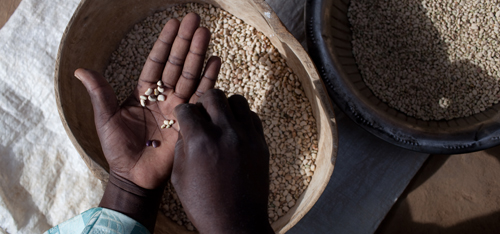Фотогалерея
GCP/RAF/009/NET: Sub-Regional Programme for Participative Training in Integrated Production and Pest Management through Farmer Field Schools for Benin, Burkina Faso, Mali and Senegal.
© FAO/Olivier Asselin
© FAO/Olivier Asselin
A man preparing to water his crops. GCP/RAF/009/NET: Sub-Regional Programme for Participative Training in Integrated Production and Pest Management through Farmer Field Schools for Benin, Burkina Faso, Mali and Senegal.
©FAO/Olivier Asselin
19 May 2010, Pont Gendarme, Senegal – Women sifting grains of rice. GCP/RAF/009/NET: Sub-Regional Programme for Participative Training in Integrated Production and Pest Management through Farmer Field Schools for Benin, Burkina Faso, Mali and Senegal.
©FAO/Olivier Asselin
20 May 2010, Kodith, Senegal – A group of farmers learning about insect damage and pesticide use at a Farmer Field School (FFS). The FFS Facilitator Abou Harouna Anne (left) was trained under the IPPM Programme to teach farmers about improved farming techniques.
GCP/RAF/009/NET: Sub-Regional Programme for Participative Training in Integrated Production and Pest Management through Farmer Field Schools for Benin, Burkina Faso, Mali and Senegal.
©FAO/Olivier Asselin
17 May 2010, Thiaye, Senegal – A plant soaked in colored water demonstrating how pesticides enter the plant through its roots during a weekly IPPM training session outside the village of Thiaye.
GCP/RAF/009/NET: Sub-Regional Programme for Participative Training in Integrated Production and Pest Management through Farmer Field Schools for Benin, Burkina Faso, Mali and Senegal.
© FAO/Olivier Asselin
Mali – Storage of cotton during harvest, before transportation to factory.
GCP/RAF/482/EC "Supporting competitiveness and sustainable intensification of African cotton sectors through capacity development on integrated production and pest management (IPPM)". The project aims to contribute to healthy cotton sectors in Burkina Faso, Mali, Senegal, Tanzania and Zambia, and to increase the incomes of cotton farming families.
Mali – Training of facilitators in the cotton fields.
GCP/RAF/482/EC "Supporting competitiveness and sustainable intensification of African cotton sectors through capacity development on integrated production and pest management (IPPM)". The project aims to contribute to healthy cotton sectors in Burkina Faso, Mali, Senegal, Tanzania and Zambia, and to increase the incomes of cotton farming families.
Mali – There are three kinds of sorgo grown here, the largest, hanging down called pablo, the one straight grinka and hybrid of grinka called yerewolu. Examing quality of seeds and looking for pests.
Field studies undertaken in Mali at an FFS undertaken by the IPPM programme.
© Susan van t’Riet











